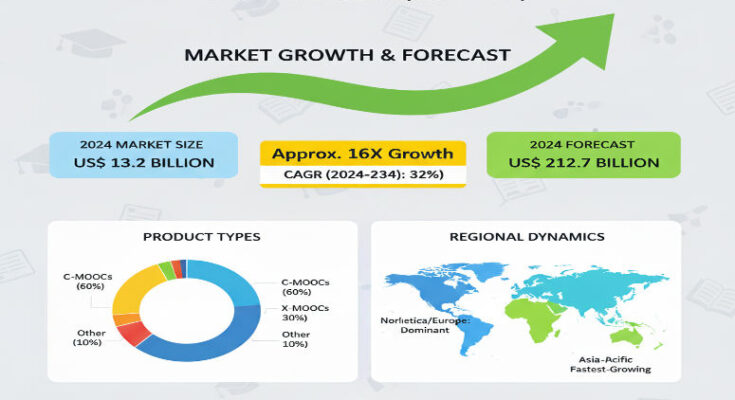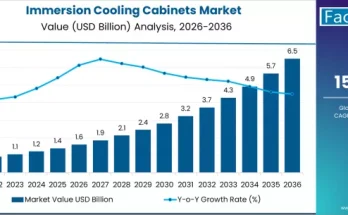The global Massive Open Online Course (MOOC) market is experiencing a transformative growth phase, driven by the widespread adoption of digital learning, the expansion of broadband access, and an increasing preference for affordable, flexible education options. According to recent market insights, the MOOC market size is projected to reach US$ 9.37 billion in 2024, with forecasts indicating a robust expansion to US$ 73.19 billion by 2034, advancing at an impressive compound annual growth rate (CAGR) of 22.9% during the forecast period.
Driving Forces Behind the Growth
The accelerating growth of the MOOC market can be attributed to the global digital transformation and the democratization of education through technology. Universities and institutions worldwide are increasingly leveraging MOOC platforms to reach a global learner base, offering accessible education at scale. The rising number of smartphone users and advancements in cloud computing have further simplified access to digital courses.
Moreover, corporations are integrating MOOCs into their employee learning and development programs, boosting the MOOC market share across the professional education segment. The increasing demand for upskilling and reskilling, especially in fields like data analytics, AI, and cybersecurity, is expected to sustain this momentum over the next decade.
Technological Advancements Reshaping Learning
Innovations in artificial intelligence, personalized learning algorithms, and data-driven analytics are reshaping how MOOCs are delivered and consumed. AI-powered platforms can now track learner behavior, assess performance, and recommend personalized learning paths, making digital education more effective and engaging. Additionally, the integration of virtual reality (VR) and augmented reality (AR) in MOOC content is enhancing learner immersion and interactivity, opening new possibilities for remote experiential learning.
The inclusion of blockchain technology for credential verification is another significant trend transforming the sector. This ensures transparency and authenticity in certifications, further strengthening the credibility of MOOCs among employers and academic institutions.
Regional Insights: United States and Europe Lead the Charge
In the United States, the MOOC market continues to thrive due to the early adoption of digital learning infrastructure and a robust network of leading providers such as Coursera, edX, and Udacity. The U.S. also benefits from strategic partnerships between tech companies and universities that are driving innovation in online education. Government initiatives promoting lifelong learning and workforce retraining are further fueling the market’s growth.
In Europe, countries such as the United Kingdom, Germany, and France are witnessing rapid expansion in MOOC adoption, particularly across higher education and professional learning sectors. The European Commission’s emphasis on digital transformation in education through initiatives like the Digital Education Action Plan has encouraged the integration of MOOCs into mainstream education systems. Furthermore, multilingual content availability and regional collaborations are enhancing accessibility across diverse learner demographics.
Massive Open Online Course (MOOC) market Opportunities and Growth Outlook
The MOOC market forecast suggests that Asia-Pacific will emerge as a lucrative region, propelled by expanding internet access, government-led education reforms, and growing youth populations eager for skill-based learning. The region’s burgeoning tech-savvy workforce is creating new opportunities for both global and local MOOC providers.
The MOOC market growth in 2025 and beyond will also be supported by the increasing adoption of subscription-based learning models and corporate learning partnerships. Companies are now viewing MOOCs as strategic tools to bridge skill gaps, enhance workforce productivity, and drive innovation.
Competitive Landscape and Key Players
The Massive Open Online Course (MOOC) market remains highly competitive, with both established players and emerging innovators contributing to its rapid evolution. Key players include Coursera, edX, Udacity, FutureLearn, iversity, LinkedIn Learning, Udemy, XuetangX, Canvas Network, and SWAYAM. These companies are focusing on enhancing course quality, expanding their content libraries, and forging partnerships with top universities and corporations.
Coursera and edX, for example, continue to lead in university collaborations and certification programs, while Udemy and LinkedIn Learning dominate the professional learning segment. Platforms like FutureLearn and SWAYAM are also playing vital roles in promoting regional and language-specific content, ensuring inclusivity in education.
Browse Full Report: https://www.factmr.com/report/3077/mooc-market
Future Outlook
As education continues to evolve into a hybrid model combining traditional and digital approaches, MOOCs are expected to remain at the forefront of this transformation. The market’s future will be shaped by continuous technological innovation, learner-centric design, and strategic collaborations across academia, industry, and government sectors.
By 2034, the Massive Open Online Course market is anticipated to become a cornerstone of the global education ecosystem—bridging gaps in accessibility, affordability, and quality while empowering learners across all age groups to thrive in the digital era.
In essence, the MOOC market size and share are set for unprecedented expansion, marking a paradigm shift in how knowledge is delivered, consumed, and valued in the 21st century.



